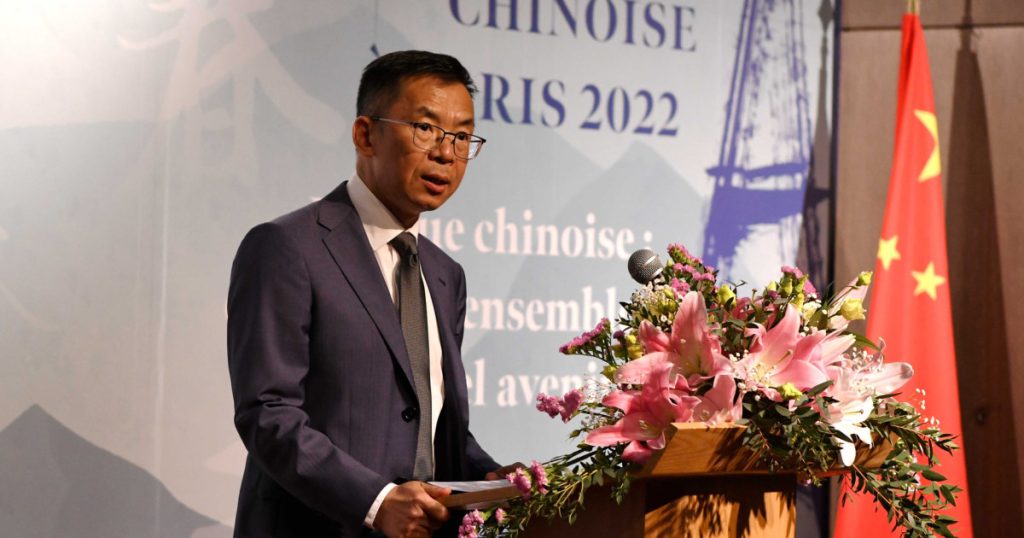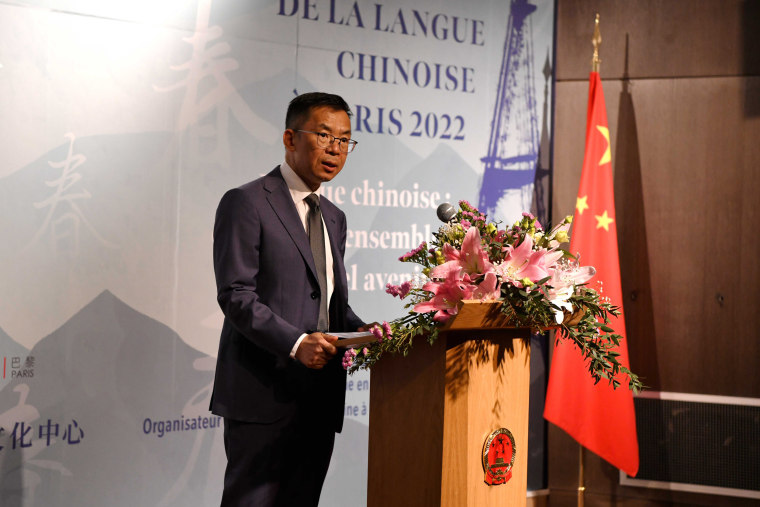
A routine TV interview has sent waves of anger and suspicion through Europe, undermining China’s efforts to position itself as a neutral peace broker and diplomatic rival to the United States.
Beijing appeared to be scrambling Monday to contain the fallout from comments by its top diplomat in Paris, who sparked uproar by questioning the legitimacy of former Soviet states.
The remarks were the latest twist in China’s complex and at times uneasy relationship with the continent, as it seeks closer economic ties and to be seen as a possible mediator between Russia and Ukraine.
Lu Shaye, China’s ambassador to France, said the countries in eastern Europe that gained independence following the USSR’s fall in 1991 did not have “effective” sovereign status in international law.

What China thinks is crucial, because it says it wants to play a neutral mediator role in the conflict. In reality, it has lent financial and rhetorical support to Moscow — and the ambassador’s remarks only heightened unease and incredulity among the Kremlin’s critics.
Officials reacted furiously, especially in Baltic countries Latvia, Estonia and Lithuania, which are in constant fear of meddling and even attack from neighboring Russia.
Meanwhile in Ukraine itself, presidential advisor Mykhailo Podolyak wrote on Twitter, “If you want to be a major political player, do not parrot the propaganda of Russian outsiders…”
Lu has “pulled the rug out from under China’s intention of being any sort of mediator between Russia and Ukraine,” tweeted Sari Arho Havrén, an adjunct professor at the George G Marshall European Center for Security Studies, a research organization run by the American and German militaries. “Not recognizing Ukraine as a sovereign state, exactly as Russia claims, makes China 100% on Russia’s side.”
On Monday, the government in Beijing appeared to downplay Lu’s remarks, emphasizing China’s preferred role as honest broker in the war and any Russo-European strife.
“China respects all countries’ sovereignty, independence and territorial integrity,” Mao Ning, a spokesperson for China’s foreign ministry, told a daily briefing when asked about the comments. Mao added that Beijing was among the first countries to establish diplomatic connections with the newly independent states in the early 1990s.
The spokesperson did not directly address Lu’s comments, which came Friday in an interview with French news channel LCI.
Lu, one of China’s self-styled “wolf warrior diplomats,” who has courted controversy since being deployed to Paris in 2019, was asked whether Ukraine should control Crimea, its peninsula that was illegally annexed by Russia in 2014.
For Ukrainians and most Europeans it’s a no-brainer, but Lu equivocated. “That depends, he said. “There’s the history. Crimea was at the beginning Russian, no? It was Khrushchev who gave Crimea to Ukraine in the era of the Soviet Union,” he added, referring to Nikita Khrushchev who was Soviet leader in the 1950s and 60s.
He then expanded this thinking to the other countries.
“With regards to international law, even these ex-Soviet Union countries” do not have status that is “effective in international law, because there is no international agreement to solidify their status as a sovereign country,” he said.
The French foreign ministry noted in the ensuing uproar that China was among the many countries to recognize Ukraine’s borders — including Crimea — when it became independent.
Europe is grappling with how to approach China.
Some — such as French President Emmanuel Macron — are wary of following the hawkish bilateralism of the U.S. Some of the largest European countries, namely Germany, are economically dependent on their large trading relationships with Beijing.
But Lu’s remarks were seen as no less explosive.
Putin has regularly questioned the legitimacy of Ukraine in a similar way — arguing that it was never really a proper country in its own right. And the Baltic states fear he may use similar logic to make aggressive claims over them too.
Latvia, Lithuania and Estonia all said they would summon their respective Chinese ambassadors.
Lithuanian Foreign Minister Gabrielius Landsbergis tweeted, “If anyone is still wondering why the Baltic States don’t trust China to ‘broker peace in Ukraine,’ here’s a Chinese ambassador arguing that Crimea is Russian and our countries’ borders have no legal basis.”
E.U. foreign affairs chief Josep Borrell said in a statement that the ambassador’s comment was “unacceptable.”
The 27-nation bloc would “assess and recalibrate strategy toward China” at a meeting of foreign ministers on Monday, he said according to Reuters, with Lu’s comments set to be part of the discussion.
“We will have to continue discussions about China, it is one of the most important issues of our foreign policy,” he said.
 Latest Breaking News Online News Portal
Latest Breaking News Online News Portal





